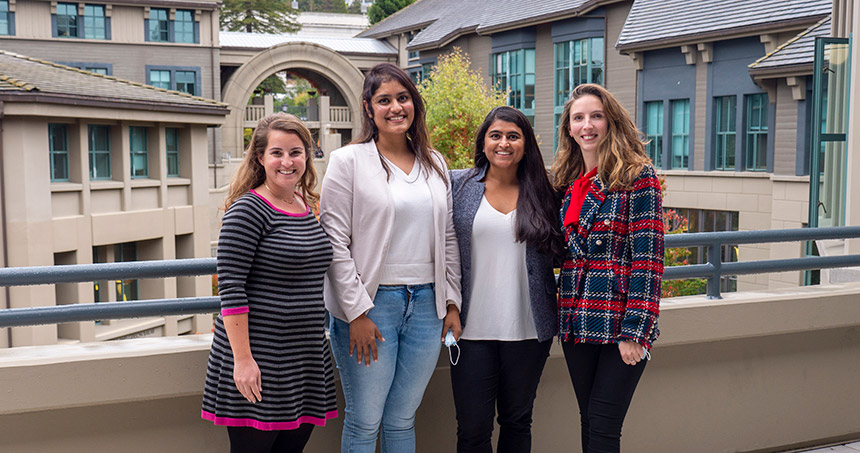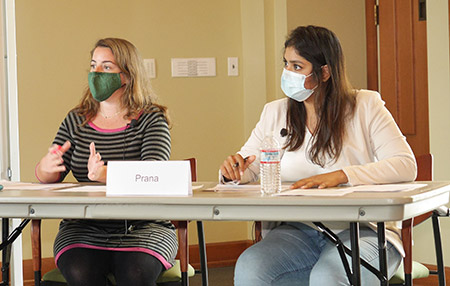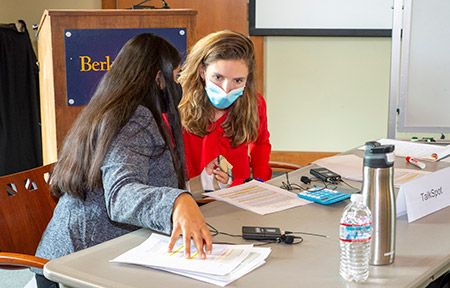
By Andrew Cohen
For a fast-rising number of lawyers, understanding the business world is more than an intellectual curiosity. It’s an occupational necessity.
The Halloum Business Competition provides another case in point. Combining the skill sets of Berkeley Law and Berkeley Haas MBA students to navigate a simulated complex transaction based on actual fact patterns, the unique annual event featured 24 teams this year — significantly more than the usual field.

LL.M. students Laura Quazzo and Capucine Freydrich, teaming with Haas students Riddhima Batta and Alana Bhatla respectively, reached the final round and engaged in a spirited negotiation before a live audience on November 1. Quazzo and Batta were named the winners by a split ballot from three experts serving as judges, including Berkeley Center for Law and Business Executive Director Adam Sterling ’13.
“The Halloum Business Competition provides an incredible experience for Berkeley Law students,” says Sterling, joined on the judges’ panel by Ryan Sefidfard (global head of M&A at Rambus) and Mark Altman (senior director of legal at Nvidia Corporation). “Working with Haas students, they tackle negotiations based on real-world deals and trends. For example, this year’s fact pattern involved a venture-backed company considering an acquisition or public offering via SPAC (special purpose acquisition company).”
Quazzo has worked in-house for technology companies, most recently at Airbnb. A San Francisco native who got her law degree in England, she sought out the competition “because it offers experience for what I’ll be doing in practice as an associate and gives me the chance to work with Haas students.”
The process, she says, “required skills I haven’t had to use in the classroom, including finding solutions to real-world issues, negotiating with a party with competing interests, and considering both the business and legal implications of our hypothetical scenarios. Practicing these skills was extremely rewarding.”
Valuable collaboration
Open to all Berkeley Law 2Ls, 3Ls, and LL.M. students, the competition gives teams a chance to jointly analyze a complex transaction, educate one another, and develop a cohesive strategy using each member’s strengths. As in actual practice, success hinges on the ability to work cooperatively both alongside and across the negotiation table.
Each round builds on the last, moving the negotiation from startup to merger or acquisition. Teams receive shared facts as well as confidential facts that drive their approach.

“Business students and law students don’t necessarily have the same priorities during a negotiation, so it was very interesting to learn from Alana’s perspective,” Freydrich says. “It taught me to have a more business-like vision on certain points, which will help me in my future negotiations.”
The final round featured a 40-minute negotiation period, after which the teams had five minutes to prepare for self-analysis. They then took turns presenting to the judges for five minutes, explaining their strategy, describing what they did well and could have done better, and answering questions.
Quazzo and Batta represented “Prana,” an accessibility software that serves neurodiverse people. Following several successful financing rounds, Prana — which had experienced a 48% surge in its downloads and a seven-fold increase in advertising business on its website — was considering next steps.
Freydrich and Bhatla represented “TalkSpot,” a virtual counseling company and Prana’s largest customer, which helped Prana expand significantly through licensing deals. Some dubious corporate governance issues created bad press for TalkSpot, which Prana had to weigh along with the company’s advantages.
Calling it “extremely valuable” to work with Riddhima, Quazzo says, “She offered the ‘CEO’ perspective and pointed out things that were important to founders that aren’t as important to lawyers. This will be very helpful in my career. I’m going into the emerging company space, so my clients will likely be CEOs, founders, and former business students — maybe even a few of the ones I met through this competition.”
Bottom line brokering
The negotiation boiled down to Prana deciding whether to license its technology to TalkSpot and go public, or agree to TalkSpot’s acquisition proposal. Key elements discussed included purchase price, the future of Prana’s CEO, and both non-compete and indemnification clauses.
Quazzo, who has worked in global law firms focusing on corporate transactional law, waded through determining a purchase price for the startup based on a set of detailed financial data.
“This isn’t something I’d done before and I had to work with my business school teammate to determine what would be an acceptable price and what would be a good price to shoot for,” she says. “During the negotiations we were learning about the other side’s priorities and what points they had wiggle room on. This meant my team had to shift our approach in real time to adjust to the new information we were receiving.”
Freydrich, who graduated from the University of Paris Dauphine with a master’s degree in International and European Business Law, worked for two years in legal departments of Paris tech companies before coming to Berkeley.
“I wanted to negotiate a complex case in real time with an MBA student,” she says. “I’ve negotiated many contracts in my professional life, and this competition was an opportunity to do so in English. The most challenging parts were assimilating the facts in a short period of time and dealing with the financial aspects of the negotiation. The most rewarding parts were getting to the finals and meeting and working with Alana. We made a great team.”
The competition is funded by Berkeley Law alumnus Joseph Halloum ’10, a corporate partner in the Silicon Valley office of Freshfields. The competition’s student directors this year, Berkeley Law’s Anne Luquette and Haas’ Vaibhav Anand, won the event last year and went on to compete in another external competition together.